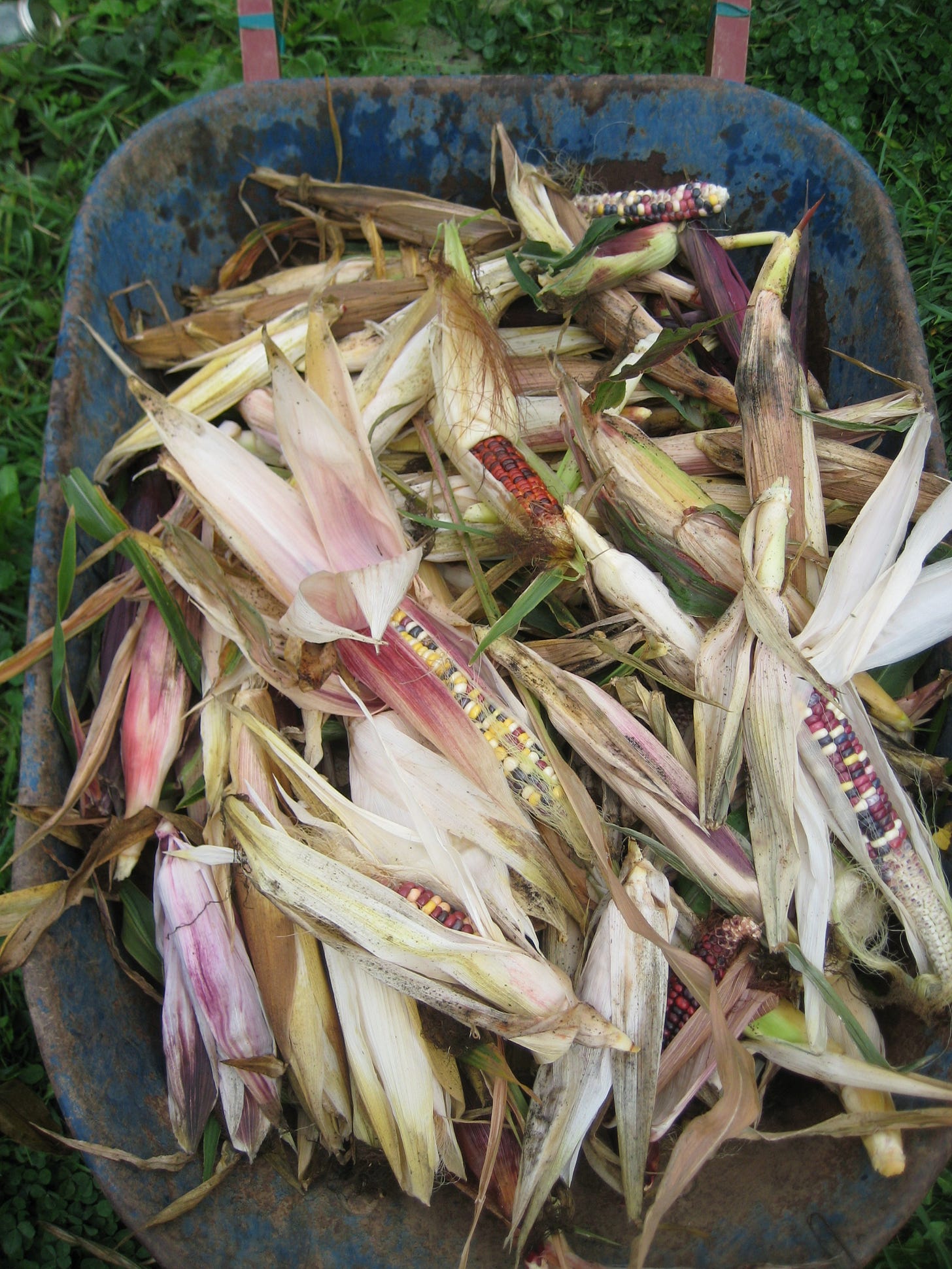So with the preamble of Part 1 over, let me dive into the principles of my food philosophy, with the understanding that (1) everyone is different, (2) there is no one right way, and (3) that I am far from perfect myself in living up to my own philosophy.
I strive to be connected to my food. Whether that connection comes from having grown or foraged it myself, bought it from a farmer I know or a farm I’ve visited, or from a recipe handed down by my grandmother, having some kind of connection to it is half the battle. It’s hard for me to explain why, but this is the most important principle for me. It’s my north star. Maybe this is where the sacred comes in. Up until very recently in our evolutionary history, we never would have consumed food whose origin was unknown to us. Maybe it is hardwired into us to resist anonymous food. My spirit, anyway, revolts against it. It might fill my belly, but it never feeds my soul. And food should always nourish more than the body.
If this sounds too woo-woo, let me point out that food grown locally is likely to be fresher, and therefore more healthy. I heard on a recent podcast that the USDA says that produce loses 10% of its nutrients per day after harvest, and that the average vegetable on a supermarket shelf is 14 days old. Do that math.
Eating local inevitably means eating seasonally, too. I’ve probably taken this too far in the past, such as winters where I tried to continue to get all my veggies locally. Nothing but icicles grow in a Canadian winter, so it means a lot of root vegetables and cabbage, as well as anything I’ve been able to preserve. If well prepared, you can eat fairly well all winter. But my health probably suffered somewhat from my fixation on eating local. It was just so hard to muster any enthusiasm for buying vegetables from California, after a summer of lavishing in the bounty of local farms and my personal garden. I now make some exceptions when snow blankets the growing fields around me, but I do still vastly favour local food. Out of season tomatoes are not worth eating, in my opinion, but I make up for this dietary celibacy by gorging on them when in season, while reminding my palate from time to time of their umami-ness with what of their summer’s essence I’ve managed to preserve in the freezer.
Short of going to the farm itself to buy food, shopping at a farmers’ market is about as close to the source as you can get with purchased food. I love farmers’ markets. When I travel, one of my first stops is always at the local market. I feel like they display the best of humanity; all feels right with the world when I’m there. The conversations sparked during chance encounters seem as important as the goods for sale. The vendors are all following their dreams, and the customers get to buy little slices of those dreams and take them home to be savoured. Food you have a connection to, whether bought at a farmers’ market or elsewhere, is just so much more enjoyable, and…
Enjoying your food is good for your health. Wait, what? Many of us are still caught in a puritanical paradigm that says the things we most enjoy – fat, sugar, salt, and now alcoholic beverages – are bad for us and must be minimized as much as possible. If we do indulge, we’re wracked with guilt afterwards. But numerous studies have shown correlations between enjoyment and better health. One way this works is that pleasure releases dopamine, which in turn aids digestion. Neither should we overlook the mental health benefits of enjoyable mealtimes, often in the company of friends or family. Food is more than nutritional packets; it is pleasure and communion.
There is also a strong correlation between flavour and nutrition. We often hear about how our bodies, evolved on the hardscrabble savanna, hone in like heat seeking missiles on the fat and sugar that used to be hard to find, but is now too readily available. What we rarely hear is that our bodies also gravitate towards fruits and vegetables packed with nutrients. My son loves carrots, sweet and juicy and crunchy, fresh from our home garden or a local farm, but is uninterested in carrots from afar. Kids like their vegetables when their bodies like the nutrients, because they actually taste better, and adults are no different (though their intellects tend to get more in the way).
Due to modern farming techniques, including breeding for appearance and shippability rather than vitamins and minerals, nutrients in various vegetables and fruits declined by 6% to 38% in the latter half of the 20th century. Is it a coincidence that modern diseases, such as obesity, diabetes, cancer, and auto-immune disorders, rose during that same time period? Americans spend the least on food, as a percentage of expenditures, at 6.4%, while also spending the most on healthcare of any technologically advanced nation. Canada is more middle of the pack, spending 9.1% on food and slightly below the average for comparable countries on healthcare. If food is not your medicine, then medicine will be your medicine. Food tastes better.
One of my favourite cookbooks is called Salt Fat Acid Heat, referring to the four elements that go into great tasting food (it was made into a Netflix series). The Anglo North American mind often wonders uncomprehendingly at the relative health of the French, despite their rich cuisine. I’m sure part of the explanation rests in the fact that they truly enjoy what they eat; healthier greens, for instance, are rendered more delicious with the addition of butter and cream, leading to the consumption of more greens. More delicious food leads to more satisfaction derived from smaller portions. And the overlay of wine elevates mealtime into something more special, stimulating digestion as well as conversation, and ties the whole experience together into a whole that nourishes mental health as much as it does physical.
(A note about alcohol: I’m willing to accept that consuming more than the now recommended one drink per week might shorten my life a bit, with the understanding that my life will be much more enjoyable if I consume a moderate amount of alcoholic beverages with meals. I like to have a glass of wine or beer or cider with most dinners, and pairing the correct drink with the meal has become part of the whole experience for me. I’ve learned that my nearly 50 year old body revolts the next day against excesses beyond two drinks the night before. But I would hate to think of a life where I didn’t get to regularly try the latest offerings from artisanal vineyards, breweries, and distilleries. And I’m convinced that the best fermented beverages, like the homemade cider I make every fall from the wild apples we harvest from the trees growing around us, is chalk full of nutritional benefits that may cancel out the small amount of sin inflicted by those fermented sugars.)
This is not to say that overindulgence is impossible. Which is why I try to…
Listen to what my body says after eating different foods. You may momentarily enjoy a poutine, but rarely does the body rejoice after wolfing down that sloppy mess of old fryer grease and sodium. Do you feel energized after eating, or like you need to take a nap? Food should not just taste good, but feel good in your body. It’s not that hard to listen to your body – although it may seem difficult at first if you’ve gotten out of the habit.
Once you relearn this skill, you can even ask your body what it feels like eating right now. Pregnant women tend to be expert at this, inhaling a jar of pickles or a tub of ice cream if that’s what their body – and that of their unborn child – is craving. Try to listen to what your body is telling you it needs, and follow its lead. Your body knows what it needs to be healthy, and in this case at least, your gut is smarter than your brain.
Animals are also very good at this. Studies of sheep, for instance, have found that if you put out buckets containing different minerals, each sheep will consume just the right amount of each mineral that they need. Cows will also self-select the forbs they need from diverse pastures.
The human intellect has found all sorts of ways to confuse this basic conversation between brain and gut, whether through tempting recipes or the latest dietary guidance. I don’t place much stock in nutritional science; it attempts to understand an incredibly complex system, and through a partial understanding give one-size-fits-all advice to incredibly diverse people. That’s why its recommendations keep changing (remember when all fats were “bad”?). I would rank it as a pseudo-science, alongside disciplines like economics or polling or psychology. I much prefer to just listen to my body – it’s had billions of years of evolution to figure out the best answer to the question, “What’s for dinner?”
In addition to how evolution has shaped our diet over eons, culture has fine-tuned it over millennia, so I try to pay particular attention to what my ancestors ate. Every culture in the world seems to venerate its culinary tradition, except for what we call the “Western diet” – which actually means the Anglo diet, exported to its colonies in the Americas and Australia, and to the world through the vanguard of McDonald’s (although the hamburger is actually a German creation). We are repeatedly cautioned about the unhealthiness of this diet of imperialism, although it is unclear whether we are actually criticizing the diet or the imperialism. What is clear is that the real problem with the Western diet as currently practiced is that it has been itself colonized by the industrial food system, and the frozen burger patties (whether real meat or some lab-grown simulacrum) and white buns it churns out can barely be labelled food.
My own culinary heritage stems from the British Isles, which may not rank up there with the greatest cuisines of the world (I give that honour to nations such as Italy, France, Japan, China, India, Lebanon, and Mexico), but has a certain comforting charm to many of its dishes. Fish and chips, after all, must be in the upper echelons of culinary creations, despite – or perhaps because of – it’s unhealthfulness. If you’ve ever read the series of children’s adventure novels The Famous Five, set in post-Second World War England, you can’t help noticing how often the young eponymous protagonists take a break from their crime-solving to sit down to a good feed. Here’s one description from the book: "A large ham sat on the table, and there were crusty loaves of new bread. Crisp lettuces, dewy and cool, and red radishes were side by side in a big glass dish, great slabs of butter and jugs of creamy milk." Is your mouth watering? And while these fictional children often wash it all down with non-alcoholic “lashings of ginger beer”, who can deny the denizens of these isles their due for their contributions to the arts of beer, cider, and whisky making? France may get quite stuffy about the perfection of its wines, and deservedly so, but the India Pale Ale has conquered the world in a more plebeian way.
I’m not saying that we should never eat the cuisines of other cultures, or engage in creative fusion (my favourite summer lunch is a classic English tomato sandwich slathered in mayo, with a Cypriot slab of fried halloumi cheese tucked in between the slices), but that our bodies probably have a genetic predisposition to the foods our ancestors ate for centuries. Lactose tolerance is an obvious example, but I think the connection extends into more subtle affinities as well. So just because my ancestors did many terrible things while colonizing much of the world, it doesn’t mean that I have to throw out their entire menu as well - and it might just be a way of re-indigenizing myself. Eating the foods my ancestors ate is another way to gain greater connection to my food, and through it to a larger world in both space and time.
That’s it for Part 2. In Part 3, I’ll continue exploring a few more of my food principles. If you’re subscribed, just sit back and wait for it to hit your inbox. If not, consider subscribing!








What a lovely read <3 Inspiring to make choices out of respect for the sacred. Another reason I enjoy eating locally is it makes reducing plastic waste much easier as well.
Your relishing of food is itself enjoyable to me. And I think you've earned the right to supremely relish it given your labours as a farmer, your studies and your thoughtfulness on the subject.